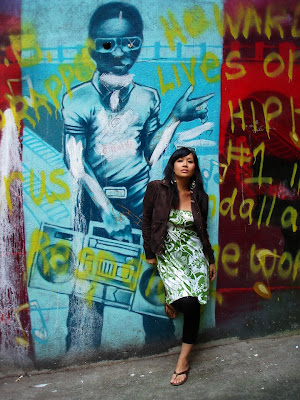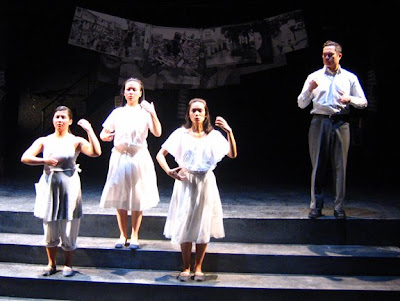 1) What the fuck is going on?
1) What the fuck is going on?
You’ll just have to see. Come see the show and find out!
2) How has the upcoming production of People Power at Theatre Passe Muraille developed since its workshop presentation at the 2006 SummerWorks festival?
In addition to a few new characters being thrown in to the mix, the individual journeys of existing characters have been more deeply explored. The addition of sound design, movement and audience participation contribute to a fuller, more exciting theatrical experience.
3) What does the 1986 People Power Revolution in the Philippines mean to you?
Since I was still a child when it took place, it has only been through the process of creating this play that I have gained an in-depth understanding of the People Power Revolution. Much like the approach we took in telling this story, I believe that the true spirit of this revolution lies not in the powerful political and religious figures lauded for their pivotal roles, but in the millions of everyday, average people who came together to ignite change. Many of these people had a lot to lose, many had nothing left. Recognizing my own privilege living as a citizen of a first-world nation, the notion of TRUE sacrifice is something that I admit has never been really tested. We live in such an individualistic society, constantly bitching and moaning about the slightest of inconveniences in our comfortable lives.
The People Power Revolution is a humbling reminder that there are far worse injustices in the world than paying higher taxes on a pack of cigarettes or paying $2 more for a drink at a bar in Yorkville than at a bar in the Annex. In a country like the Philippines, which has an alarmingly violent history of oppression and colonization, the ability of its people to topple a powerful dictatorship peacefully is truly extraordinary and inspiring. The lesson it has to teach resonates all the more today, as the people of an increasing number of nations around the world fight corrupt governments and military regimes.
 4) What is a balikbayan?
4) What is a balikbayan?
Literally translated, “balikbayan” means “to return to the motherland.” The term balikbayan is used for people who were either born in the Philippines and have moved to another country or for Filipinos born in another country who have come back to visit the Philippines (or in some cases, come back for good).
5) How connected do you feel to Filipino narrative traditions?
I feel deeply connected and enthusiastic about the new narrative traditions emerging from young Filipino-Canadian and Filipino-American artists today. As the offspring of a post-colonial society, and what my sister, Caroline, has labeled the “first post-modern culture”, modern Filipinos bear no identity outside of a colonized one.
Hundreds and hundreds of years of colonization by the Spanish, the Chinese, the Japanese and the Americans erased the Philippine Islands’ rich history of tribal traditions which have only recently re-surfaced through anthropological studies. These traditions have been embraced and re-interpreted by a new generation of young Filipino artists in North America eager to piece together a history and a culture they can truly and proudly call their own.
Examples of this at work are local Filipino-Canadian filmmakers’ The Digital Sweatshop’s film Ang Pamana: The Inheritance, which draws from age-old Filipino mythological creatures set within a modern-day Filipino-Canadian context; another local Filipino artist, accessories designer Melissa Clemente calls her designs an “interpretation of folk dance costume focusing on art forms from the mountain regions of the Philippines.” Len Cervantes, a spoken word artist, borrows from ancient Filipino poetic forms such as balagtasan (a form of debate and verse) and tanaga (a set rhyme and syllabic scheme) in his work.
For more information on Filipino-Canadian artists doing their thing, see the Kapisanan Philippine Centre for Arts + Culture, a local youth-centred facililty that provides a space for young Filipino-Canadians to explore their identity and roots through the lens of arts and culture.
6) How does your background as a graphic designer inform your approach to making theatre?
It doesn’t. I believe a significant reason I enjoy theatre so much is that it offers me a brief escape from my work as a graphic designer.
I work from home, by myself, with only a mini dachshund named Buddy for company. The long hours spent alone, staring at a computer screen, sitting on my ass without moving for several hours at a time, not only result in locked knees, but in borderline insanity. Don’t get me wrong. I absolutely LOVE LOVE LOVE being a graphic designer – I consider myself extremely lucky for not being someone who sits on the subway every morning hating my life and everyone in it because my job sucks.
I love what I do but like I said, the solitary nature of my work drives me crazy sometimes. Theatre, on the other hand, is as extroverted as my work as a designer is introverted. It is interactive. It is collaborative. It requires me to use my limbs and my voice. It allows me to me to write again (something I had abandoned in favour of going to art school). It reminds me I’m alive, which is a very, very good thing.
 L to R: Rose Cortez, Christine Mangosing, Nadine Villasin and Leon Aureus in People Power. Photo by Caroline Mangosing
L to R: Rose Cortez, Christine Mangosing, Nadine Villasin and Leon Aureus in People Power. Photo by Caroline Mangosing7) How important is it for artists to be actively challenging systems of oppression in their work?
I believe art and social commentary go hand in hand. Art, in whatever form, has served as a means to relay social and political events, opinions, and ideas throughout history. It is more important than ever to use art as a means of challenging systems of oppression. Leave the superficial trash to the makers of reality television. Society needs to be reminded on a constant basis that oppression exists – racism STILL exists, misogyny STILL exists, the list goes on and on. Art, whether it be visual, performance or literary, loses its weight if it’s not saying anything at all. I could go on and on about this topic but I’ll stop here.
8) Having lived in both Vancouver and Toronto, have you noticed any similarities or differences in the way the two cities approach theatre?
The first time I ever acted (aside from playing a peasant in my 5th grade Easter play, that is), wrote a play, or did anything remotely related to theatre at all was here in Toronto. If anyone had told me six years ago that I would not only be living in Toronto, but also writing plays and, god forbid, acting in them, I would have laughed in their face.
In fact, when I was studying Fine Arts in Vancouver, we shared a building with the Theatre program . . . but the Fine Arts kids and the Theatre kids hated each other with a passion. Even our teachers would slam the doors of our classrooms with disdain to shut out the sounds of the Theatre kids across the hall “finding their inner animal.” Now, every time I warm-up for a show or for rehearsal and make all those weird noises I used to roll my eyes at, I laugh at myself for becoming the “theatre kid” I once hated.
9) What form will the revolution take?
Hopefully, if any lesson is to be learned from the People Power Revolution, a non-violent one.
10) What can North American theatre makers learn from the way artists are working in the Philippines?
See answer to question #8. My experience in theatre is limited to Toronto so it would not be fair for me to comment on theatre in the other cities I have lived.
This history, this rich story, had,up until I went to see People Power, only existed in my head as a vague childhood memory that had something to do with Imelda Marcos’ many shoes.
thank-you for telling this story!
well said christine!
i’m personally eagerly anticipating seeing “people power” at TPM soon. as a 1st gen fil-can… i think it’s one of the few ways that we can truly understand who we are, and where we come from. the q&a session after sunday’s performance should be an excellent dialogue-starter….